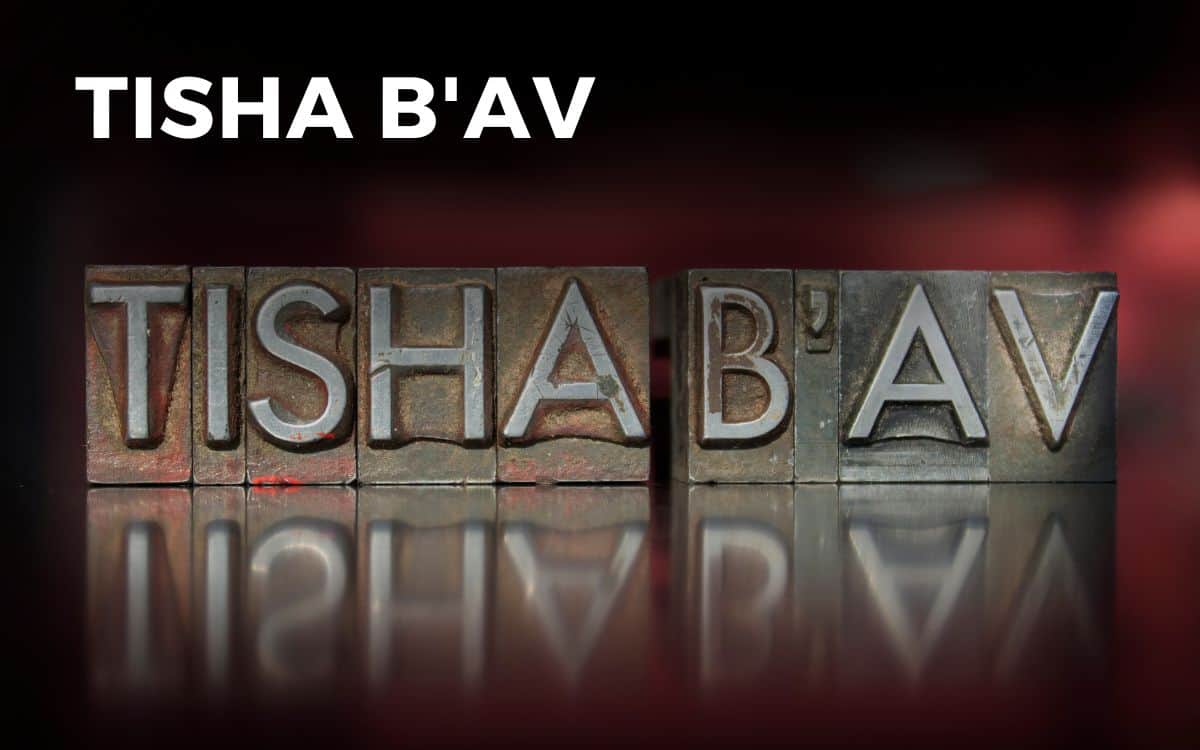Tisha B’Av begins at sundown on Monday, August 12, and ends at nightfall on Tuesday, August 13. This significant Jewish day commemorates the destruction of the two Temples in Jerusalem and other tragedies in Jewish history. Understanding the historical and cultural significance of Tisha B’Av can provide valuable insights into Jewish traditions and beliefs.

When is Tisha B’Av?
Amidst the summer heat and holiday cheer, August 13th marks a significant day on the calendar for many. It’s the date when Tisha B’Av, a solemn day of mourning and fasting in the Jewish calendar, is observed. This day commemorates the destruction of the First and Second Temples in Jerusalem and other tragic events in Jewish history.
Tisha B’Av typically falls in July or August, following the Hebrew calendar. The date varies each year in the Gregorian calendar due to the differences in the lengths of the two calendars’ months. In 2024, Tisha B’Av lands on August 13th, a date that holds deep historical and religious significance for Jewish communities worldwide.
Observing Tisha B’Av involves refraining from eating or drinking, abstaining from pleasurable activities, and attending synagogue services to read from the Book of Lamentations. It’s a day for reflection, remembrance, and honoring the resilience of the Jewish people throughout history.
History of Tisha B’Av
Tisha B’Av, the ninth day of the Hebrew month of Av, is a solemn day of mourning and fasting in Judaism. Its origins lie in the destruction of the First and Second Temples in Jerusalem, as well as other calamities that have befallen the Jewish people throughout history.
The First Temple, built by King Solomon, was destroyed by the Babylonians in 586 BCE. This event marked a turning point in Jewish history, as it led to the exile of many Jews to Babylon. The Second Temple, which stood on the same site, was destroyed by the Romans in 70 CE, following a Jewish revolt against Roman rule. These tragedies are central to the observance of Tisha B’Av, as they represent the loss of Jewish sovereignty and the exile of the Jewish people from their homeland.
In addition to the destruction of the Temples, Tisha B’Av is also associated with other calamities in Jewish history, including the expulsion of Jews from Spain in 1492 and the outbreak of World War I in 1914, which ultimately led to the Holocaust.
The observance of Tisha B’Av has evolved over time, with various traditions and customs developing around the holiday. These include fasting from food and drink, refraining from bathing or wearing leather shoes, and reading the Book of Lamentations, which mourns the destruction of Jerusalem. Many Jews also refrain from engaging in activities such as working, studying Torah, or listening to music on Tisha B’Av.
How to Celebrate Tisha B’Av
If you’re wondering how to celebrate Tisha B’Av, there are various ways to observe this solemn day. Individuals can choose to fast, read lamentations, and refrain from joyful activities.
Businesses can show respect by closing early, offering a moment of silence, or supporting charitable causes in remembrance.
How Individuals Can Celebrate Tisha B’Av
Want to honor Tisha B’Av in meaningful ways? Check out these five creative ideas to commemorate the occasion in a memorable manner. From fasting and prayer to reading sacred texts, there are various ways for you to observe this solemn day. Let’s explore unique ways to connect with the significance of Tisha B’Av.
- Interactive Virtual Vigil: Host a virtual gathering where participants can share prayers, reflections, and personal stories related to Tisha B’Av. Utilize video conferencing platforms to create a sense of community and connection despite physical distance.
- Artistic Expression: Encourage individuals to express their emotions and experiences through various forms of art, such as painting, poetry, or music. Organize an online art exhibition or open mic night to showcase these creative works and foster dialogue.
- Educational Workshops: Offer workshops or seminars exploring the historical significance and contemporary relevance of Tisha B’Av. Topics could include the symbolism of mourning customs, lessons from Jewish history, or discussions on social justice and activism.
- Community Service Projects: Mobilize volunteers to participate in acts of tikkun olam (repairing the world) as a way of honoring the spirit of Tisha B’Av. This could involve volunteering at local shelters, organizing donation drives, or engaging in environmental cleanup efforts.
- Digital Storytelling Project: Launch a collaborative storytelling project where participants share personal narratives or family histories related to themes of loss, resilience, and hope. Compile these stories into a digital anthology or multimedia presentation to share with a wider audience.
How Businesses Can Celebrate Tisha B’Av
Looking to infuse your business with the spirit of Tisha B’Av? There are innovative ways to engage your employees, attract customers, and showcase the holiday’s essence. Let’s explore actionable strategies that will help your business celebrate Tisha B’Av in a meaningful and impactful way.
- Host a Virtual Memorial Service: Engage employees and customers in a meaningful reflection.
- Offer Special Discounts: Attract customers with exclusive Tisha B’Av promotions.
- Create a Commemorative Product Line: Showcase the holiday spirit through unique merchandise.
- Organize a Charity Drive: Give back to the community in remembrance.
- Facilitate Team Volunteer Opportunities: Unite employees in acts of kindness.
Social Media Post Ideas for Tisha B’Av
Looking to engage your audience this Tisha B’Av? Share meaningful quotes, historical facts, or personal reflections on your social media platforms. Encourage discussions and show support for those observing the day. Don’t forget to tailor your posts to resonate with both individuals and businesses in a respectful and inclusive manner.
Social Media Post Ideas for Individuals to Use on Tisha B’Av
When it comes to Tisha B’Av, you can leverage social media to connect and engage with others. Consider sharing historical facts about the day to educate your followers. Encourage reflection and remembrance by posting thoughtful quotes or personal insights.
- Educational Infographics: Design and share informative infographics on Tisha B’Av, highlighting its historical background, significance, and rituals. Use engaging visuals and concise captions to capture attention and encourage learning.
- Personal Reflections: Write and share personal reflections or testimonials about the meaning of Tisha B’Av in your life or how you observe the day. Include photos or videos to add depth and authenticity to your posts.
- Historical Trivia: Create and post trivia questions related to Jewish history, focusing on events or figures associated with Tisha B’Av. Encourage followers to interact by guessing the answers and providing additional context.
- Virtual Candle Lighting: Start a social media campaign where participants share photos or videos of themselves lighting candles in remembrance of Tisha B’Av. Use a designated hashtag to track and showcase these posts across different platforms.
- Call to Action for Charity: Use your platform to raise awareness about charitable causes related to Tisha B’Av, such as supporting organizations that aid refugees or promote peace-building initiatives. Encourage followers to donate or volunteer their time in honor of the holiday.
Social Media Post Ideas for Businesses to Use on Tisha B’Av
Thinking about how to leverage social media for Tisha B’Av in your business? Here are five quick ways to incorporate the holiday into your online presence:
- Promote Relevant Products or Services: Highlight products or services that are meaningful for Tisha B’Av observance, such as candles, memorial books, or charitable donation options. Emphasize their significance in commemorating the holiday.
- Share Educational Content: Create and share informative posts about the history and significance of Tisha B’Av, including its relevance to Jewish customers. Use engaging visuals and concise captions to convey key messages.
- Offer Special Discounts or Promotions: Extend special discounts or promotions for Tisha B’Av-related products or services as a way of acknowledging the holiday and showing appreciation to customers. Use targeted social media ads to reach relevant audiences.
- Host Virtual Events or Workshops: Organize virtual events or workshops related to Tisha B’Av themes, such as discussions on Jewish history, interfaith dialogues, or charitable initiatives. Promote these events on social media to attract participants and foster community engagement.
- Support Charitable Causes: Partner with charitable organizations that align with the values and themes of Tisha B’Av, such as those focused on refugee assistance, peace-building efforts, or social justice initiatives. Use social media to raise awareness about these causes and encourage support from your audience.
Want to create social media content 10X faster? Start your free 7-day trial of the Social Media Content Club and say goodbye to social media stress.
Hashtags to Use During Tisha B’Av
When you’re ready to boost your social media presence during Tisha B’Av, incorporating relevant hashtags can make a significant impact. These hashtags can help you connect with a wider audience and join in the online conversation surrounding this significant day.
- #TishaBAv2024
- #RememberingThePast
- #ReflectionAndRemembrance
- #UnityThroughPrayer
- #HonoringTraditions
- #HopeAndHealing
- #TogetherInPrayer
- #StrengthThroughAdversity
- #CommunitySolidarity
- #FaithAndResilience
For the complete list of holidays to celebrate on social media in August, visit AngieGensler.com/August-Holidays.
Other Holidays Related to Tisha B’Av
You’re in for a treat as we explore other holidays that share connections with Tisha B’Av. From Yom Kippur to Fast of Esther, these holidays all hold significant historical and cultural importance.Discover more related holidays by checking out our free calendar with over 1,000 unique celebrations.
- Yom Kippur: Yom Kippur, also known as the Day of Atonement, is a solemn Jewish holiday focused on repentance, fasting, and prayer, similar to Tisha B’Av in its introspective and penitential nature.
- Purim: Purim is a joyous Jewish holiday celebrating the deliverance of the Jewish people from the villain Haman, as recounted in the Book of Esther. While Purim contrasts with the somber tone of Tisha B’Av, both holidays emphasize the resilience and survival of the Jewish people.
- Pesach (Passover): Pesach commemorates the liberation of the Israelites from slavery in ancient Egypt. Like Tisha B’Av, Pesach is a holiday rich in historical significance, emphasizing themes of redemption and freedom.
- Hanukkah: Hanukkah, also known as the Festival of Lights, celebrates the rededication of the Second Temple in Jerusalem. While Hanukkah is a joyous holiday, it also has themes of resilience and perseverance in the face of oppression, similar to Tisha B’Av.
- Shavuot: Shavuot commemorates the giving of the Torah at Mount Sinai and the harvest festival in ancient Israel. While Shavuot is a celebratory holiday, it also involves reflection and study, echoing the introspective nature of Tisha B’Av.
For more holidays, download our free calendar with over 1,000 fun and unique holidays to celebrate this year. Head to angiegensler.com/holiday-calendar to grab your free copy.
Future Dates for Tisha B’Av
Check out the future dates for Tisha B’Av in the table below. Plan ahead for the upcoming years to mark this solemn occasion.
| Year | Month | Day |
|---|---|---|
| 2024 | August 12th | Monday |
| 2025 | August 3rd | Sunday |
| 2026 | July 23rd | Thursday |
| 2027 | August 12th | Thursday |
| 2028 | July 31st | Monday |
| 2029 | July 21st | Saturday |
Frequently Asked Questions
If you’re curious about Tisha B’Av, you might’ve some burning questions. Let’s clear things up for you with some common FAQs on this significant day. heck out the following FAQs to get the answers you need.
What is the historical background of Tisha B’Av?
Tisha B’Av commemorates the destruction of the First and Second Temples in Jerusalem.
How can small businesses observe Tisha B’Av respectfully?
Small businesses can honor Tisha B’Av by dimming lights, refraining from music, and minimizing celebratory decorations.
Are there any traditional practices small businesses can incorporate for Tisha B’Av?
Observing a moment of silence, reading relevant historical texts, and offering reflective activities are some traditional practices small businesses can consider for Tisha B’Av.
Conclusion
In conclusion, Tisha B’Av stands as a poignant reminder of the trials and tribulations endured by the Jewish people throughout history. From the destruction of the Temples to more recent tragedies, this solemn day serves as a time for reflection, mourning, and remembrance. Through its rituals, traditions, and symbolism, Tisha B’Av encourages us to confront the past, honor the memories of those who came before us, and strive for a better future. As we observe this day of mourning, let us also commit ourselves to acts of kindness, charity, and social justice, embodying the values of resilience and compassion that define the Jewish spirit. Whether through communal gatherings, personal reflection, or online engagement, let us come together to ensure that the lessons of Tisha B’Av continue to resonate and inspire action in our lives and communities.
Celebrate this special day with us, and don’t forget to download our free holiday calendar for more fun and unique holidays to celebrate this year.















